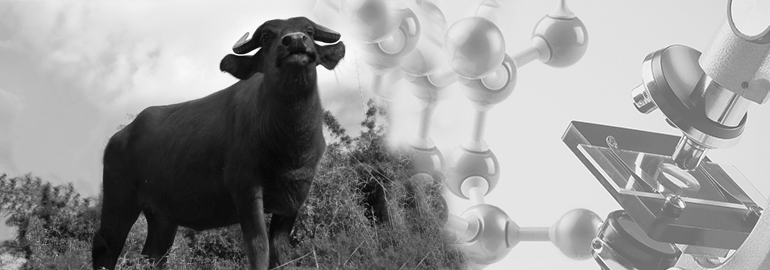The rate of loss of genetic material is proceeding at an alarming pace thereby increasing threats to the maintenance of genetic biodiversity. The conservation of existing genetic materials in regions where the water buffalo exists is a significant contribution in ensuring long-term and sustainable buffalo genetic improvement program.
PCC’s efforts to conserve existing local germplasm are complemented with the judicious introduction of riverine buffalo germplasm into pre- identified population of swamp buffaloes. This is intended to improve the genetic potentials for milk and meat production, thus maximizing benefits from this species to meet the immediate and medium-term requirements of the rural poor and the growing human population.
Genepool for Swamp Buffalo
Gene Pool for Philippine Swamp Buffalo. The Gene Pool for indigenous Philippine swamp buffalo is at PCC at Cagayan State University (PCC at CSU) with its farm in Piat, Cagayan. Currently, there are 84 selected native carabaos in this institutional herd. Recording growth performance and selecting the best young bulls as breeders is a continuing activity and for 2011, four superior swamp buffalo bulls were selected for training as semen donors. Two of the selected bulls were sent to PCC at CLSU’s SPL at Digdig.
The satellite facility for PCC Gene Pool at the Isabela State University, Echague, Isabela has been assisted in 2011 to be able to retrieve all data backlogs.
In situ Conservation and Propagation of Native Carabaos. There are three sites for natural conservation and propagation of the Philippine carabaos (PCs). Two sites are being monitored and coordinated by the PCC at CSU, located in Villa Rey, Piat, Cagayan and in Bangad, Kalinga. In these sites, an “entrustment approach” is the scheme, i.e., farmer-cooperators were given selected native carabaos for their normal farming activities. The animals are also raised for breeding purposes. In Villa Rey, there are 15 selected female PCs and one male PC, whereas in Bangad, Kalinga, there are 25 selected female PCs and one male PC. Reproductive performance and growth rates of the carabaos are gathered regularly.
Genepool for Riverine Buffalo
An open nucleus herd of elite riverine breed of buffalos (Murrah-based) for milk production, forms the National Gene Pool (NGP) located in the PCC National Headquarters, Science City of Muñoz, Nueva Ecija. Sustained introduction of the best germplasm from all over the world, complemented with rigorous selection, testing and evaluation, ensures the production of better riverine breeding animals in a sustained fashion.
Top proven sires for wide-scale genetic improvement of existing purebred riverine herds and for upgrading of local (native) animal stocks are taken from the NGP in the form of semen, which is utilized for a nationwide artificial insemination program.
There are also institutional herds, which serve as satellite gene pools and are found in the care and management of PCC regional centers located in the Central and Southern parts of the country.
Purebred riverine buffalos are also maintained at the farmer’s holdings via the Dairy Buffalo Modules and their performance data are continuously recorded, gathered, and evaluated. Top performing female animals are either brought to the nucleus herd or retained in the farmers’ care to serve as dams of future sires.
Intensified Upgrading of Carabaos
First generation crossbreeds produced from the crossing (mating) of Murrah buffalo and Philippine carabao grow as much as 70%-100% faster and produce 200%-300% more milk than their local parents without detrimental effects on draftability and reproduction. Continued backcrossing of crossbreeds with purebred Murrah has also resulted in increasing milk productivity. The additional income generated from this increased productivity is expected to significantly improve the economic status of small-scale farming families.
Wide-scale upgrading to benefit more families is being carried out through the judicious use of artificial insemination (AI) and natural mating (via the PCC’s Bull Loan Program) in key carabao development areas.
In the earlier years of PCC operations, the AI activities are carried out largely by the AI technicians of the PCC and the Local Government Units (LGUs). Recent initiatives were undertaken by PCC to develop and empower hundreds of private, village-based AI technicians (VBAITs) who are currently providing more than 50% of the total AI output (services) in water buffalos across the country. More VBAITs shall be trained as the AI program continues to expand in the coming years.
To complement the AI services in the villages, outstanding bulls for natural mating are also loaned out to farmer groups in areas where AI services are not readily available.

